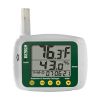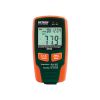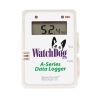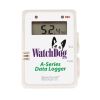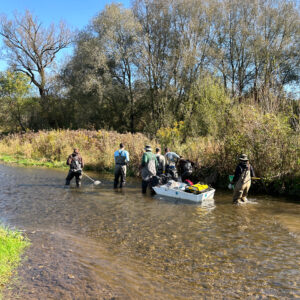Onset HOBO UX100 Temp/RH Loggers
Features
- Large memory capacity
- Visual high & low alarm thresholds
- User-replaceable RH sensors
- Expedited repair and warranty service
- Lifetime technical support
- More
Overview
The HOBO UX100 temperature and humidity series data loggers track temperature and relative humidity in indoor environments. Records temperature in indoor environments. Ideal for monitoring occupant comfort in office buildings, tracking warehouse storage conditions, and logging temperature trends in server rooms.
Design
HOBO UX100 Series offers a dramatic price/performance advantage over competitive products by delivering higher accuracy, larger measurement capacity, and more LCD display features to make environmental data collection faster and easier than ever. The loggers provide a variety of features to reduce deployment time and offer new logging modes for recording and displaying more detailed data without extensive post-processing or memory use.
Temperature Sensor
Range: -20° to 70°C (-4° to 158°F)
Accuracy: ±0.21°C from 0° to 50°C (±0.38°F from 32° to 122°F)
Resolution: 0.024°C at 25°C (0.04°F at 77°F)
Response time: 8 minutes in air moving 1 m/s (2.2 mph)
Drift: <0.1°C (0.18°F) per year
Data Logger
Logging: -20° to 70°C (-4° to 158°F); 0 to 95% RH (non-condensing)
Launch/readout: 0° to 50°C (32° to 122°F) per USB specification
Logging rate: 1 second to 18 hours, 12 minutes, 15 seconds
Logging modes: Normal, Burst or Statistics
Memory modes: Wrap when Full or Stop when Full
Start modes: Immediately, Push Button, Date & Time or Next Interval
Stop modes: When Memory Full, Push Button, or Date & Time
Restart mode: Push Button
Time accuracy: ±1 minute per month at 25°C (77°F)
Battery life: 1 year, typical with logging rate of 1 minute and sampling interval of 15 seconds or greater
Battery type: One 3V CR2032 lithium battery
Memory: 128 KB (84,650 measurements, maximum)
Download type: USB 2.0 interface
Full memory download time: 20 seconds
LCD: LCD is visible from: 0° to 50°C (32° to 122°F); the LCD may react slowly or go blank in temperatures outside this range
Size: 3.66 x 5.94 x 1.52 cm (1.44 x 2.34 x 0.6 in.)
Weight: 23 g (0.81 oz)
Environmental rating: IP50
- HOBO UX100-001 Temp Data Logger
- Command™ strip
- Double-sided tape
- Hook & loop strap
In The News
Monitoring and Facilitating Habitat Restoration Efforts in the Great Lakes
While human infrastructure, urbanization, and industrialization have advanced human societies, the natural environment has suffered due to constructed impediments and deteriorating architecture. In order to combat this degradation, habitat restoration programs across the US work to remove impairments and improve damaged waterways. [caption id="attachment_39162" align="aligncenter" width="940"] Barge electrofishing by state and federal employees prior to habitat restoration on Wiscoy Creek which is a tributary to the Genesee River. (Credit Thomas Hoffman)[/caption] Habitat Restoration Efforts in the Great Lakes Tom Hoffman, aquatic habitat restoration biologist in the Lower Great Lakes basin, directs restoration efforts within tributaries to Lake Erie, Lake Ontario, and the St.
Read MoreSustainable Fishing in Alaska: Protecting the Salmon Capital of the World through Research
In the far north, the Alaska Peninsula stretches away from the Last Frontier into the Pacific Ocean. A narrow strip of land dotted with freshwater lakes and intruded upon by ocean inlets–this unique region is intimately connected with the surrounding water. Nestled halfway down the peninsula's southern coast are the small villages of Chignik. The area has historically been home to the Aleut people and has been heavily reliant on fishing for centuries. Home to commercial and subsistence fishing today, Chignik continues to rely upon the salmon returns to the surrounding villages, which are supported by scientists working tirelessly to understand and steward these fish populations.
Read MoreNexSens X3 Data Logger Review
Extreme environments meet extreme design with the NexSens X3 Data Logger . The new logger offers the latest in real-time monitoring technology with wireless communication, a large plug-and-play sensor library and ultra-low power consumption, all in a waterproof marine-grade housing. The X3 is built to handle harsh weather, floods, high winds and rough seas, and it stands alone; no additional protective housing needed. With an operating temperature that ranges from -40°C to 70°C, the logger can withstand arctic environments and extreme heat. A conformal coating on the internal circuit board isolates it from moisture and humidity.
Read More












